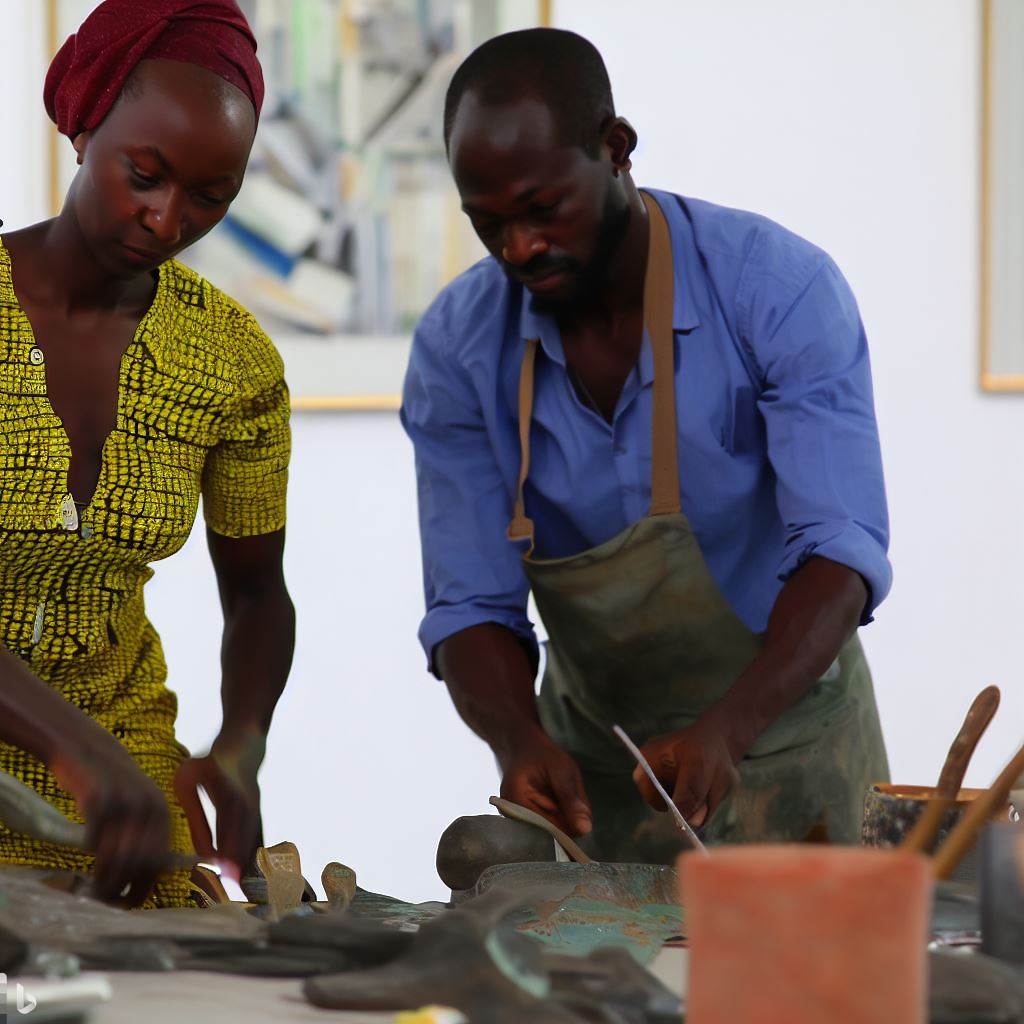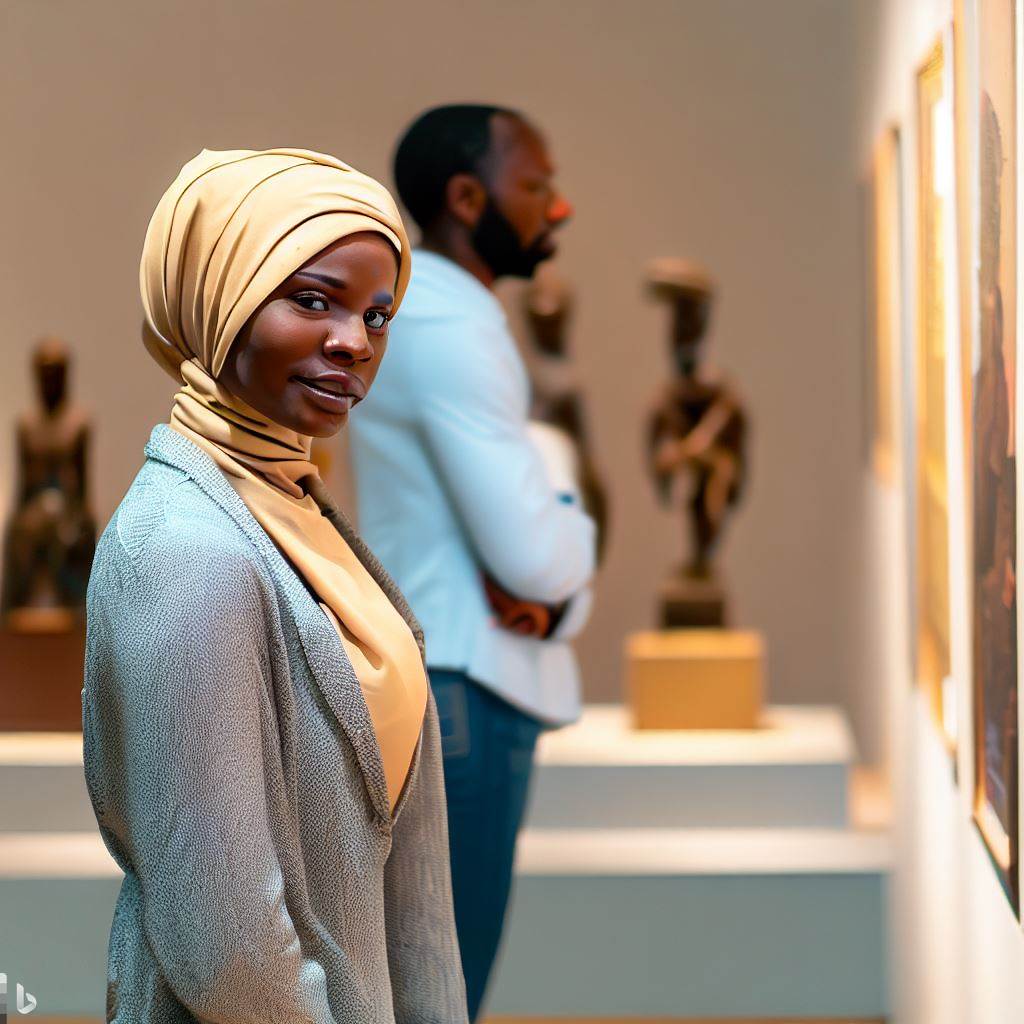Introduction
One of the sought-after careers in Nigeria is a curator job. In various industries, curators play a crucial role in preserving and presenting valuable collections.
With the growing interest in arts, culture, and history, the demand for curators in Nigeria is increasing rapidly.
A curator job involves:
- Art Selection: Curators choose artworks, artifacts, or exhibits for display.
- Exhibition Design: They design and arrange exhibits to engage and educate audiences.
- Research: Curators delve into the history and context of the pieces they curate.
Importance of Curators Across Industries
Curators play crucial roles:
- Preservation: They safeguard cultural heritage, ensuring its longevity.
- Education: Curators inform and inspire, promoting learning and appreciation.
- Curation Trends: They shape trends, influencing cultural discourse and creativity.
Demand for Curators in Nigeria
In Nigeria, there’s a rising demand for curators:
- Cultural Revival: As Nigeria celebrates its heritage, curators are needed to curate exhibitions and collections.
- Museums and Galleries: Cultural institutions seek skilled curators to enhance their offerings.
- Private Sector: Corporations engage curators for art collections, fostering a vibrant arts scene.
Landing your first curator job in Nigeria involves skill development, networking, and a passion for preserving and sharing cultural treasures.
Research and Self-Assessment
Research and self-assessment play a crucial role in obtaining your first curator job in Nigeria.
By understanding the different types of curator jobs available, researching their qualifications and skills requirements, and assessing your personal interests and aptitudes related to curating, you can increase your chances of securing a job in this field.
Types of Curator Jobs
- Art Curator: Responsible for managing and exhibiting various forms of art in galleries or museums.
- Museum Curator: In charge of preserving and interpreting historical artifacts and collections in museums.
- Archaeological Curator: Involved in the proper handling and curation of archaeological artifacts.
- Heritage Curator: Works towards conserving and showcasing cultural heritage sites, monuments, and traditions.
- Science Curator: Focuses on curating scientific collections and exhibits, such as specimens or geological artifacts.
Researching Each Type
To increase your chances of obtaining a curator job, it is essential to have a clear understanding of the qualifications and skills required for each type of curator job.
Start by researching the educational qualifications typically expected for each specific role.
For example, an art curator may need a degree in art history or fine arts, while a science curator may require a background in the relevant scientific field.
Next, identify the specific skills and experience that are valued in the industry.
This may include knowledge of conservation techniques, proficiency in digital cataloging systems, or expertise in organizing exhibitions and public programs.
Assessing Personal Interests and Aptitudes
Curating is a specialized field, and it is essential to find a job that aligns with your personal interests and aptitudes.
Take some time to reflect on what aspects of curating appeal to you the most.
Consider whether you have a passion for art, history, science, or heritage conservation.
Evaluate your organizational skills, attention to detail, and ability to work independently or as part of a team.
Identifying these interests and strengths will help you choose the right curator job and focus your efforts on securing it.
Networking and Gaining Experience
While conducting your research and self-assessment, it is crucial to network with professionals in the field.
Attend conferences, workshops, and exhibitions related to curating to connect with individuals who can provide valuable insights and advice.
Additionally, gaining practical experience through internships or volunteer work can significantly enhance your chances of securing your first curator job.
Seek opportunities to work in galleries, museums, or heritage organizations to develop practical skills and showcase your dedication to the field.
Continuing Education and Professional Development
Curating is a dynamic field, and it is essential to stay updated with the latest trends, technologies, and methodologies.
Consider participating in continuing education programs, workshops, or certifications related to curating.
Continuously expand your knowledge of different art forms, historical periods, scientific advancements, or heritage conservation techniques.
This ongoing learning will make you more competitive in the job market and demonstrate your commitment to professional development.
Basically, researching and conducting a self-assessment are key steps towards obtaining your first curator job in Nigeria.
Understanding the different types of curator jobs available, researching their qualifications and skills requirements, assessing your personal interests and aptitudes, networking, gaining practical experience, and pursuing continuing education are all crucial aspects of successfully entering this exciting and rewarding field.
Read: Becoming a Museum Curator in Nigeria: A Step-by-Step Guide
Gaining Relevant Education and Experience
To gain a curator job in Nigeria, it is crucial to have relevant education and experience. Here are three important steps to follow:
- Pursuing a degree in art history, museum studies, or related fields is essential. This education provides in-depth knowledge and understanding of the art world.
- Considering internships or volunteer positions in museums or art galleries is a great way to gain practical experience. These opportunities allow for hands-on learning and exposure to different aspects of curatorial work.
- Networking with professionals in the industry is crucial for expanding knowledge and opportunities. Attending conferences, workshops, and art events where curators are present can help establish valuable connections and open doors for potential job opportunities.
By following these steps, aspiring curators in Nigeria can increase their chances of obtaining their first curator job.
Developing Curatorial Skills
In order to get your first curator job in Nigeria, it is important to develop the necessary curatorial skills. Here are some key skills to focus on:
1. Learning about collection management and curation techniques
- Attend workshops, seminars, and conferences related to collection management and curation
- Read books and publications on the subject to gain a deeper understanding
- Seek mentorship from experienced curators who can guide you in this area
2. Building knowledge of art or artifacts preservation and restoration
- Observe and assist in preservation and restoration projects to gain hands-on experience
- Study the different techniques and materials used in preservation and restoration
- Stay updated on the latest advancements in preservation and restoration practices
3. Developing research, critical analysis, and writing skills
- Engage in research projects to enhance your research abilities
- Practice critical analysis by studying various artworks and artifacts
- Improve your writing skills by regularly writing exhibition proposals and curatorial essays
- Seek feedback from professionals to refine your research, critical analysis, and writing skills
By focusing on developing these skills, you will increase your chances of securing a curator job in Nigeria. Remember to stay proactive and continuously seek opportunities to learn and improve in the field.
Building a Professional Portfolio
When seeking your first curator job in Nigeria, having a strong professional portfolio is essential.
A well-organized portfolio can showcase your academic achievements, relevant projects, research papers, and curated exhibits or art installations, and can greatly increase your chances of securing a curator position.
Showcasing academic achievements, relevant projects, and research papers
Include a section in your portfolio highlighting your academic achievements, such as your degrees, certifications, and relevant coursework.
Emphasize any courses or projects that demonstrate your expertise in art curation or related fields.
Additionally, showcase any research papers or publications that you have authored or contributed to in the art world.
For example, if you have written academic papers on specific art movements or artists, include them in your portfolio to demonstrate your in-depth knowledge and research skills.
Including photographs of any curated exhibits or art installations
A visual representation of your work is crucial for a curator.
Include high-quality photographs of any exhibits or art installations that you have curated or participated in.
These visuals will help potential employers evaluate your skills in organizing and presenting artworks.
Make sure to capture the essence of the artworks and the overall atmosphere of the exhibition or installation.
Choose images that display your ability to curate pieces effectively and create an engaging experience for viewers.
Obtaining recommendation letters from mentors or supervisors
It’s vital to gather recommendation letters from mentors or supervisors who can vouch for your abilities as a curator.
These letters can provide valuable insights into your work ethic, attention to detail, professionalism, and collaboration skills.
Reach out to professors, supervisors from internships or relevant work experiences, or other professionals who have observed your curatorial talents.
Ask them to emphasize specific projects or qualities that make you stand out as a potential curator. Include these recommendation letters in your portfolio to enhance your credibility.
Generally, building a professional portfolio is crucial when aiming to secure your first curator job in Nigeria.
Showcase your academic achievements, relevant projects, and research papers to demonstrate your expertise and knowledge.
Include photographs of curated exhibits or art installations to illustrate your practical skills and artistic vision.
Finally, obtain recommendation letters from mentors or supervisors to enhance your credibility as a curator.
With a strong portfolio, you will increase your chances of getting noticed and landing your first curator job in Nigeria.
Read: The Role of Curators in Nigeria’s Growing Art Scene

Job Search Strategies
In order to secure your first curator job in Nigeria, it is important to utilize effective job search strategies. These strategies include:
Exploring job boards, online platforms, and social media for job postings
One of the most common ways to find job opportunities is by searching through job boards and online platforms.
Websites like LinkedIn, Indeed, and Jobberman often have a wide range of curator positions available.
Additionally, many companies and organizations now post job openings on their social media pages, so be sure to follow and check these platforms regularly.
Attending industry events, conferences, and career fairs.
Industry events, conferences, and career fairs provide excellent opportunities to network with professionals in the curating field and learn about job openings.
Make sure to attend relevant events in your area and connect with people who may have knowledge of available positions.
This will not only help you stay updated on current trends in the field but also increase your chance of finding job opportunities.
Utilizing personal networks and connections to uncover hidden opportunities
Your personal networks and connections can be valuable resources when searching for a curator job.
Reach out to friends, family members, former colleagues, and professors who may have connections in the industry.
Networking with individuals already working in the field can provide you with insider information about job openings that may not be publicly advertised.
By leveraging these job search strategies, you will increase your chances of securing your first curator job in Nigeria.
Exploring job boards, attending industry events, and utilizing personal networks will help you uncover hidden opportunities and stay ahead in a competitive job market.
Read: Women Curators in Nigeria: Breaking Cultural Barriers
Preparing for Interviews
When preparing for curator job interviews in Nigeria, there are several important steps you should take to increase your chances of success.
Researching the hiring organization and their collection or exhibits
- Visit the organization’s website to gather information about their mission, vision, and goals.
- Learn about the specific collection or exhibits they have and familiarize yourself with their unique attributes.
- Show that you have done your homework during the interview by mentioning specific details about the organization and their work.
Practicing common interview questions and preparing thoughtful responses
- Research typical interview questions for curator positions and practice answering them beforehand.
- Prepare thoughtful responses that highlight your skills, experiences, and passion for the field.
- Practice articulating your thoughts clearly and concisely, as this is essential for curator roles.
Demonstrating enthusiasm, knowledge, and a willingness to learn
- Show genuine enthusiasm for the field of curating and the specific organization you are applying to.
- Highlight your knowledge of current trends, techniques, and best practices in curation.
- Express your willingness to learn and grow in the role, emphasizing your adaptability and eagerness to take on new challenges.
By following these steps, you will be well-prepared for curator job interviews in Nigeria and increase your chances of securing your first curator job.
Read: The Influence of International Curators in Nigeria
Navigating Salary Negotiation
When it comes to landing your first curator job in Nigeria, salary negotiation is an important aspect to consider. Here are some key points to keep in mind:
- Understanding average curator salaries in Nigeria: Before entering salary negotiations, it’s essential to have a clear understanding of the average curator salaries in Nigeria. This will help you set realistic expectations for your own salary.
- Knowing the value of offered benefits or additional perks: In addition to salary, it’s important to assess the value of any benefits or additional perks that are being offered. These can significantly contribute to your overall compensation package.
- Researching negotiation strategies, if applicable: If you have some negotiating power, it’s essential to research different negotiation strategies. This will help you advocate for a higher salary or better benefits during the negotiation process.
Remember, salary negotiation is a delicate process that requires diplomacy and preparation. Use your research and understanding of the situation to navigate this stage of your curator job search successfully.
Continuing Professional Development
Continuing professional development is crucial for individuals aspiring to become curators in Nigeria.
It involves staying updated on current trends and developments in curatorial practices, attending workshops, conferences, and webinars, as well as building a network of professionals and maintaining relationships in the industry.
Stay updated on current trends and developments in curatorial practices
Staying updated on current trends and developments in curatorial practices is essential to ensure that you are aware of the latest techniques, tools, and approaches being used in the field.
This can be achieved by regularly reading publications, articles, and research papers related to curatorial practices.
By keeping yourself informed, you will be able to adapt to changes and implement innovative ideas in your work.
Attend workshops, conferences, and webinars to enhance your knowledge and skills
Attending workshops, conferences, and webinars is another valuable way to enhance your knowledge and skills as a curator.
These events provide opportunities to learn from industry experts, engage in discussions, and participate in hands-on activities.
Workshops allow you to acquire practical skills and techniques, while conferences and webinars offer a platform for exchanging ideas and learning about new research findings.
Build a network of professionals in the industry and maintain relationships with them
Building a network of professionals and maintaining relationships in the industry is crucial for career growth and opportunities.
Networking enables you to connect with like-minded individuals, share knowledge, and collaborate on projects.
Attending industry events and joining professional organizations or associations can help you expand your network.
Additionally, maintaining relationships by staying in touch with colleagues, mentors, and industry leaders can open doors to new opportunities and provide valuable guidance throughout your career.
Create a personalized plan that includes specific goals and strategies
To maximize your professional development, it is essential to create a personalized plan that includes specific goals and strategies.
Identify areas you want to improve and seek out relevant resources and learning opportunities.
Set aside time for self-study, attend relevant events, and actively engage in discussions and collaborations with professionals in the field.
Furthermore, continuing professional development should not be limited to acquiring new knowledge and skills.
It should also focus on developing transferable skills such as critical thinking, problem-solving, communication, and leadership.
These skills are valuable for curators as they often work in teams, collaborate with artists and other professionals, and engage with diverse audiences.
Essentially, continuing professional development is essential for individuals seeking curator jobs in Nigeria.
Staying updated on current trends and developments in curatorial practices, attending workshops, conferences, and webinars, and building a network of professionals are key aspects of professional growth.
By actively engaging in these activities and continuously seeking opportunities to learn and improve, aspiring curators can enhance their chances of securing their first curator job and thriving in the field.
Conclusion
Throughout this blog post, we have explored the steps to secure your first curator job in Nigeria.
We discussed the importance of gaining relevant skills and knowledge through education and internships.
We also highlighted the significance of networking within the art community to create valuable connections and increase your chances of finding job opportunities.
It is crucial to be proactive in searching for curator positions, utilizing online platforms, attending art events, and submitting applications to art galleries and museums.
Aspiring curators should continuously educate themselves, staying updated on art trends, and showcasing a passion for the field.
Moreover, building a strong portfolio and resume that demonstrates your expertise and experience will greatly enhance your chances of landing your first curator job.
In a nutshell, getting your first curator job in Nigeria may require dedication, perseverance, and a proactive approach.
Recapitulating the aforementioned key points, remember to focus on education, networking, job search, and continuously improving your skills.
We encourage all readers aspiring to become curators to take action and pursue their dreams with enthusiasm and determination.
Remember, success often comes to those who are passionate and willing to go the extra mile.
So, keep striving, never stop learning, and embrace the challenges that come your way on this fulfilling journey to becoming a curator in Nigeria.




